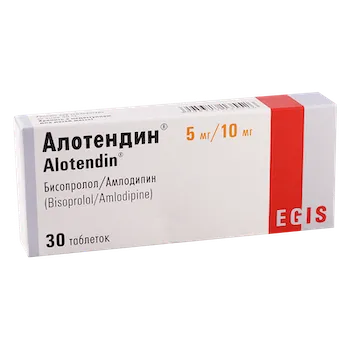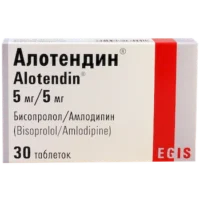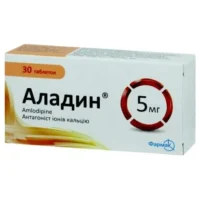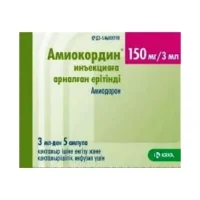Description
Alotendin (Bisoprolol) Tablets 5/10 mg. №30
Composition
Active ingredient: Bisoprolol
Other ingredients: Microcrystalline cellulose, lactose monohydrate, croscarmellose sodium, colloidal anhydrous silica, magnesium stearate.
Mechanism of Action
Bisoprolol, a beta-blocker, blocks the action of natural substances like epinephrine on the heart and blood vessels, leading to decreased heart rate, blood pressure, and cardiac strain.
Pharmacological Properties
Bisoprolol exerts its effects by selectively blocking beta-1 adrenergic receptors, resulting in reduced sympathetic activity on the heart and blood vessels.
Indications for Use
Alotendin tablets are indicated for the treatment of hypertension (high blood pressure) and the management of angina (chest pain).
Contraindications
Avoid Alotendin tablets if allergic to bisoprolol or any product components. Patients with specific heart conditions or severe circulation issues should not use this medication.
Side Effects
Common side effects may include dizziness, fatigue, or shortness of breath. Contact your healthcare provider if you experience any adverse reactions.
Usage Instructions
Take Alotendin tablets as prescribed by your healthcare provider. The recommended dose is 5-10 mg once daily, with or without food. Swallow the tablet whole with a glass of water.
Benefits Compared to Analogues
Bisoprolol has shown superior tolerability and a favorable side effect profile compared to other beta-blockers. Its once-daily dosing regimen improves patient adherence and convenience.
Suitable Patient Groups
Alotendin tablets are suitable for adult patients with hypertension or angina. Dosage adjustments may be necessary for specific patient populations such as the elderly or those with renal impairment.
Storage and Shelf Life
Store Alotendin tablets in a cool, dry place away from sunlight. Check the expiration date on the packaging and do not use expired medication.
Packaging Description
Alotendin tablets are supplied in a pack containing 30 tablets of 5/10 mg strength.
Clinical Evidence and Proven Effectiveness
Studies have shown that bisoprolol reduces cardiovascular events in hypertensive and heart failure patients. Clinical trials demonstrate its efficacy in improving cardiac function and reducing mortality rates in these populations.





